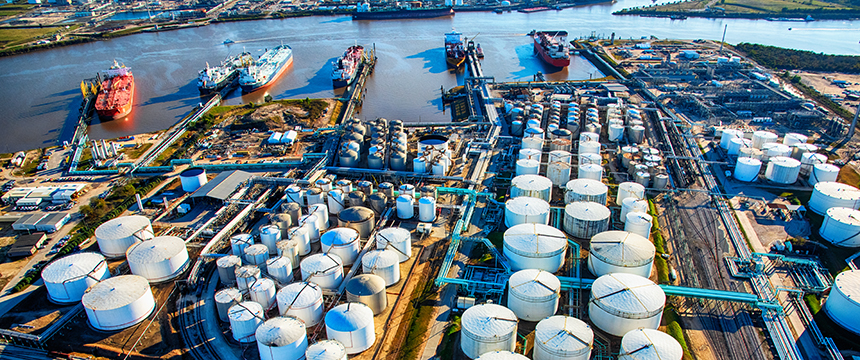Mexican Government Restricts Importation of Certain Fuels and Petrochemicals into Mexico

On October 23, 2023, the Mexican President published in the Official Gazette of the Federation a Decree under which the Mexican Government implements measures to combat the illicit trading of fuels, related to the importation of materials regulated by the Ministry of Energy (the “Decree”). The Decree establishes as a measure a temporary restriction to the importation of certain products into Mexico. Interested parties should analyze their particular situation to determine actions to be taken, such as challenging the Decree through an Amparo Constitutional trial.
To review the Decree click here.
Purpose of the Decree
According to the Decree, the importation of certain goods (Section V – Mineral Products and Section VI – Products of the chemical or allied industries of the Mexican Harmonized System) is temporarily restricted.
Goods covered under the Decree include certain Harmonized System (HS) Codes of the Mexican Tariff within the following Headings:
| Description1 | Headings included in the Decree |
| Mineral Products | 2707, 2709,2710, 2712, and 2713 |
| Products of the chemical or allied industries | 2901, 2902, 2905, 2909, and 3826 |
According to the Decree, the purpose of the suspension is to reduce the illicit trading of fuels in Mexico.
The interested parties in the importation of the goods referred in the Decree (for which an importation permit is required or not) shall request and prove to the Hydrocarbons Office of the Ministry of Energy, that the volume and destination of the materials to be imported is necessary for their production process and will serve for the development or performance of a legal activity.
For those parties that prior to the Decree had obtained an importation permit from the Ministry of Energy for the goods referred in the Decree, it is foreseen that they will be able to continue with their operations and shall be required to report, within a term of 30 business days as of the Decree, their intention to continue with the operations under the relevant permit and that the same comply with the volume and destination of the materials required for their production process.
The Ministry of Energy will have a term of 15 business days to resolve any request made by the interested parties.
New Regulation to Come
The Ministry of Energy, the Ministry of Environment and Natural Resources, the Ministry of Infrastructure, Communications and Transportation, as well as the Internal Revenue Service, the National Customs Agency, the Energy Regulatory Commission, the National Agency of Industrial Safety and Environmental Protection for the Hydrocarbons Sector, and the Environmental District Attorney, shall undertake modifications to their registries, systems, platforms (either physical or electronic), related to the importation and traceability of the goods that are subject of the Decree, as well as to amend or modify any regulatory framework or implement any other action required to fully comply with the Decree.
In addition, the National Customs Agency in coordination with the Internal Revenue Service shall determine which would be the customs facilities through which the customs clearance of the goods in the Decree must be completed.
Under the terms of the transitional provisions of the Decree, the temporary restriction on the importation of the goods subject to the Decree will be in effect until the abovementioned Agencies make the necessary adjustments to the corresponding regulations.
According to the Decree, the supply of the products referred in the Decree shall be made through Pemex and its subsidiaries or any other competent agency or instrumentality of the Mexican Government.
Amparo as an Available Remedy Against the Decree
Parties affected by the Decree will be entitled to file an Amparo (constitutional trial) before the Mexican Federal Courts to challenge the constitutionality of the Decree.
Foley attorneys have experience in energy and administrative litigation matters to assist clients in challenging this Decree and protecting their interests in Mexico.
El Gobierno de México suspende la importación de Productos Químicos y Petroquímicos a México
El 23 de octubre de 2023, el Presidente de México publicó en el Diario Oficial de la Federación un Decreto por el que se establecen medidas para el combate al mercado ilícito de combustibles, relacionadas con la importación de mercancías reguladas por la Secretaría de Energía (el “Decreto”). El Decreto establece como medida una restricción temporal a la importación de ciertos productos a México. Los interesados deberán analizar su situación particular para determinar las acciones a seguir, como lo podría ser la impugnación del Decreto a través de un juicio de Amparo.
Para revisar el Decreto haga clic aquí.
Finalidad del Decreto
De acuerdo con el Decreto, se restringe temporalmente la importación de ciertas mercancías (Sección V – Productos Minerales y Sección VI – Productos de las industrias químicas o afines del Sistema Armonizado Mexicano).
Las mercancías afectadas por el Decreto se encuentran clasificadas en fracciones arancelarias comprendidas en las siguientes partidas de la Tarifa de la Ley de los Impuestos Generales de Importación y de Exportación:
| Descripción2 | Partidas arancelarias incluidas en el Decreto |
| Productos minerales | 2707, 2709, 2710, 2712 y 2713 |
| Productos de las industrias químicas o afines | 2901, 2902, 2905, 2909 y 3826 |
De conformidad con el Decreto, el propósito de la suspensión es reducir el comercio ilícito de combustibles en México.
Los interesados en la importación de las mercancías mencionados en el Decreto (para los cuales se requiera o no un permiso de importación) deberán solicitar y acreditar ante la Oficina de Hidrocarburos de la Secretaría de Energía, que el volumen y destino de los materiales a importar es necesario para su proceso de producción, y que tenga como finalidad el desarrollo o realización de una actividad lícita.
Para aquellos interesados que, con anterioridad al Decreto, ya cuenten con un permiso de importación de la Secretaría de Energía para las mercancías a que se refiere el Decreto, éstos podrán continuar con sus operaciones y estarán obligadas a informar, en un plazo de 30 días hábiles a partir del Decreto, su intención de continuar con las operaciones bajo el permiso correspondiente y que las mismas cumplan con el volumen y destino de los materiales requeridos para su proceso de producción.
La Secretaría de Energía dispondrá de un plazo de 15 días hábiles para resolver las solicitudes realizadas por los interesados.
Nuevas Regulaciones por venir
La Secretaría de Energía, la Secretaría de Medio Ambiente y Recursos Naturales, la Secretaría de Infraestructura, Comunicaciones y Transportes, así como el Servicio de Administración Tributaria, la Agencia Nacional de Aduanas de México, la Comisión Reguladora de Energía, la Agencia Nacional de Seguridad Industrial y Protección al Medio Ambiente del Sector Hidrocarburos, y la Procuraduría Federal de Protección al Ambiente, realizará modificaciones en sus registros, sistemas, plataformas (ya sean físicas o electrónicas), relacionadas con la importación y trazabilidad de las mercancías objeto del Decreto, así como a modificar cualquier marco normativo o implementar cualquier otra acción necesaria para cumplir plenamente con el Decreto.
Adicionalmente, la Agencia Nacional de Aduanas de México en coordinación con el Servicio de Administración Tributaria deberán determinar las aduanas específicas por las que se debe practicar el despacho aduanero para la importación de las mercancías objeto del Decreto.
En los términos de las disposiciones transitorias del Decreto, la medida de restricción temporal a la importación de las mercancías objeto del Decreto se encontrará en vigor hasta en tanto el las Dependencias mencionadas en párrafos anteriores realicen los ajustes necesarios a las regulaciones correspondientes.
De conformidad con el Decreto, el suministro de los productos a que se refiere el mismo se realizará a través de Pemex y sus subsidiarias o cualquier otro organismo competente del Gobierno mexicano.
Amparo como recurso disponible contra el Decreto
Las partes afectadas por el Decreto tendrán derecho a promover un Juicio de Amparo ante los Tribunales Federales mexicanos impugnando la constitucionalidad del Decreto.
Los abogados de Foley tienen la experiencia necesaria en asuntos de litigios energéticos y administrativos para ayudar a los clientes a impugnar este Decreto y proteger sus intereses en México.
1 This chart intends to summarize the scope of the Decree. In order to confirm that the goods are covered within the Decree scope, it would be needed to analyze the specific HS Code and Commercial Identification Numbers of the products imported by the Companies.
2 En esta tabla se pretende resumir el alcance del Decreto. Para confirmar que las mercancías están comprendidas en el ámbito del Decreto, sería necesario verificar la fracción arancelaria específica y los números de identificación comercial de los productos a ser importados por las empresas.

